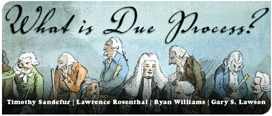I’m bewildered by Prof. Rosenthal’s references to “humility” and “prudence” when advocating for a legal position that would leave legislatures virtually unconstrained to violate the rights of individuals. I would have thought that someone advocating humility and restraint would want a strong judiciary to protect people against the brazen, often imprudent, passion-driven actions of legislatures. That, after all, was exactly the reasoning that led the founding fathers to create a strong, independent judiciary: they believed government should be humble and prudent, and should not see people as the raw materials of legislative “experimentation,” and the only preventative to this was an actively engaged judiciary.
In a democracy, writes Hamilton in Federalist 71, the people commonly intend the public good, but they do not “always reason right about the means of promoting it.” They
sometimes err; and the wonder is that they so seldom err as they do, beset, as they continually are, by the wiles of…sycophants… [and] the artifices of men who possess their confidence more than they deserve it…. When occasions present themselves, in which the interests of the people are at variance with their inclinations, it is the duty of the persons whom they have appointed to be the guardians of those interests, to withstand the temporary delusion, in order to give them time and opportunity for more cool and sedate reflection. Instances might be cited in which a conduct of this kind has saved the people from very fatal consequences of their own mistakes, and has procured lasting monuments of their gratitude to the men who had courage and magnanimity enough to serve them at the peril of their displeasure.
Humility and prudence mean respecting the rights of others and acting only in carefully considered, fully conscious, fair, non-arbitrary ways. Judicial enforcement of constitutional limits serves these ends. One who truly believes in humility and prudence should therefore welcome an engaged judiciary that will help ensure that legislatures act, not arbitrarily, but in humble and prudent ways. Observe that it’s in our era of judicial deference that government has most clearly abandoned these virtues, and imposed increasingly intrusive, ambitious, burdensome schemes—whether aimed at “social justice” or at a “morally upright society”—all built on violations of our liberty and erosions of our constitutional rights.
Take Kelo v. New London. If that case is anything, it’s a monument to judicial deference—and to government’s lack of humility and prudence when not constrained by meaningful judicial enforcement of constitutional limits. Judicial deference is the opposite of humility and prudence—it is the open door to legislative ambition and folly. (I’ll never forget the attorney for the City borrowing a famous cliché during his oral argument before the Court—the city, he said, must make the trains run on time. This, of course, was famously, and falsely, said of Mussolini.) And Kelo is hardly the only example.
As I’ve argued elsewhere, the dangers of deference far outweigh the dangers of an overly active judiciary. First, deference blinds courts to the dangers of rent-seeking and to what Cass Sunstein has called “naked preferences”: the self-interested use of government power by the politically influential. Wrongfully upholding laws is more dangerous than wrongfully striking them down, since the hardship caused by an error falls much more heavily on an oppressed individual than on a temporarily stymied legislature, and courts are poorly suited to determine what sorts of things are best relegated to the democratic process and what things are not.
In the end, the answer was given by Justice Sutherland, when he responded to Justice Brandeis’ famous dissent in New State Ice Co. v. Liebmann. Many people know of Brandeis’ dissent because he argued that states serve as “laboratories of democracy” that can “experiment” with new kinds of legislative schemes. Not many remember Sutherland’s answer: states have no legitimate power to “experiment” on human subjects against their will:
Unreasonable or arbitrary interference or restrictions [on liberty] cannot be saved…merely by calling them experimental…. [I]t would be strange and unwarranted doctrine to hold that [states] may [“experiment”] by enactments which transcend the limitations imposed upon them by the federal Constitution. The principle is imbedded in our constitutional system that there are certain essentials of liberty with which the state is not entitled to dispense in the interest of experiments.
In a majority-rules society like ours, legislative experiments are the primary threat to humility and prudence—and judicial enforcement of individual rights are the guarantors of those values.

